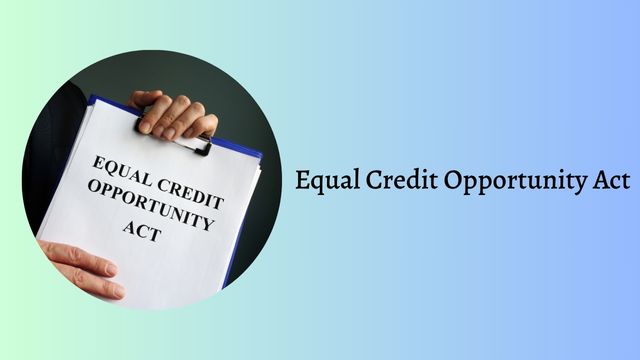The Equal Credit Opportunity Act (ECOA) is a crucial federal law designed to promote fair lending practices and prevent discrimination in the credit application process. Whether you are applying for a mortgage, auto loan, credit card, or business financing, the ECOA ensures that all applicants are evaluated based on creditworthiness rather than personal characteristics.
In this blog, we’ll explore the purpose of the Equal Credit Opportunity Act, its key provisions, how it impacts real estate transactions, and how businesses can ensure compliance. If you need expert guidance on ECOA compliance, VEGA Compliance can help streamline the process for your organization.
What Is the Equal Credit Opportunity Act?
The ECOA was enacted in 1974 to eliminate discrimination in the credit approval process. The law applies to all creditors, including banks, credit unions, mortgage lenders, and other financial institutions.
Key Objectives of ECOA
- Prohibit credit discrimination based on race, color, religion, national origin, sex, marital status, age, or receipt of public assistance.
- Ensure fair and equal access to credit for all applicants.
- Require lenders to provide explanations for credit denials.
- Protect applicants from predatory lending practices.
Understanding what ECOA stands for and its implications helps both consumers and lenders maintain transparency in financial transactions.
How Does ECOA Impact Real Estate?
The ECOA real estate regulations play a significant role in mortgage lending and property financing. Lenders must adhere to strict guidelines when evaluating loan applications to avoid discriminatory practices.
ECOA Valuations Rule & ECOA Appraisal Rule
Under the ECOA valuations rule, lenders must provide applicants with free copies of all appraisals and valuations used in the loan decision process. This ensures transparency and allows borrowers to review and dispute inaccuracies.
The ECOA appraisal rule further mandates that lenders cannot discriminate in property valuations, ensuring fair treatment for all applicants regardless of protected characteristics.
Who Is Protected Under ECOA?
The ECOA covers a wide range of credit applications, including:
- Personal loans
- Mortgages and home equity loans
- Credit cards
- Auto loans
- Business loans
Joint Applicant Meaning & Joint Credit Applications
A joint applicant is someone who applies for credit alongside another borrower, sharing equal responsibility for repayment. The ECOA ensures that lenders cannot discriminate against applicants based on their marital status when applying for joint credit.
Key Provisions of the Equal Credit Opportunity Act
Prohibition of Discrimination
- Creditors cannot deny credit based on protected characteristics.
- Spousal signatures are not always required for joint credit.
Notification Requirements
- If an application is denied, lenders must provide a written explanation (adverse action notice).
Right to Appraisal Copies
- Borrowers must receive copies of appraisals under the ECOA valuations rule.
Marital Status Protections
- Lenders cannot ask about marital status unless the applicant is applying for joint credit.
Protection Against Retaliation
- Applicants cannot be penalized for asserting their rights under ECOA.
Why Is ECOA Compliance Important?
Non-compliance with the Equal Credit Opportunity Act can result in severe penalties, including:
- Legal action by the Consumer Financial Protection Bureau (CFPB)
- Fines and reputational damage
- Lawsuits from affected applicants
Businesses must implement strong compliance programs to avoid violations. VEGA Compliance offers expert solutions to help lenders adhere to ECOA regulations efficiently.
FAQs
1. What is the purpose of the Equal Credit Opportunity Act?
The purpose of ECOA is to prevent credit discrimination and ensure fair lending practices for all applicants.
2. What type of applications does the ECOA cover?
The ECOA covers all credit applications, including mortgages, personal loans, credit cards, and business financing.
3. What does ECOA stand for?
ECOA stands for the Equal Credit Opportunity Act, a federal law regulating fair lending practices.
4. Can lenders ask about marital status under ECOA?
Lenders can only ask about marital status if the applicant is applying for joint credit.
5. What happens if a lender violates ECOA?
Lenders violating ECOA may face fines, legal action, and reputational damage. Compliance training and audits can help mitigate risks.
Conclusion
The Equal Credit Opportunity Act is a cornerstone of fair lending in the US, ensuring that credit decisions are based on financial factors rather than personal biases. Whether you are a borrower or a lender, understanding what the ECOA is and its requirements helps maintain transparency and fairness in financial transactions.
For businesses seeking assistance with ECOA compliance, VEGA Compliance provides tailored solutions to navigate regulatory requirements effectively. Stay compliant, avoid penalties, and foster trust with your customers by adhering to the ECOA.
By following these guidelines, lenders and borrowers alike can contribute to a more equitable financial system. If you have further questions about ECOA real estate rules or compliance strategies, reach out to experts who can guide you through the process.





